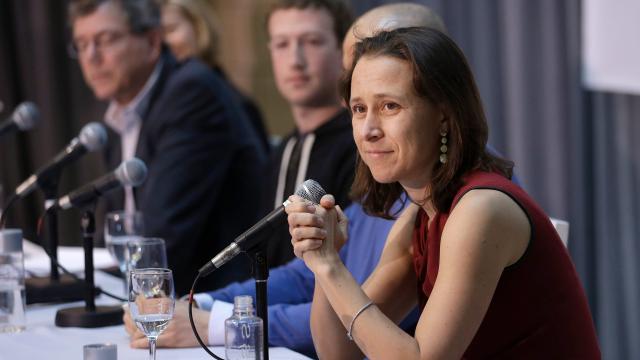23andMe CEO Anne Wojcicki.
In a provocative opinion published Monday in STAT, 23andMe CEO Anne Wojcicki argues that home DNA test customers don’t need experts to help them interpret genetic health risk reports. Wojcicki compares her company’s health reports, which tell people whether they are at risk of developing certain diseases, to at-home pregnancy tests.
“Forty years ago, when the first at-home pregnancy tests became available, some physicians warned against their use,” Wojcicki writes. “They thought women might not be able to handle such information on their own and claimed that the results might trigger them to make irrational decisions – some went so far as to claim it would lead to suicides. Looking back, it seems unthinkable that we questioned women’s ability to access this kind of information.”
But there is one fairly large problem with that comparison: Unlike pregnancy tests, which tell you simply whether you are pregnant or not, a test for genetic risk is quite complicated.
Take 23andMe’s test for BRCA variants, which the FDA recently approved. The new test will analyse DNA for three of the more 1,000 known BRCA mutations that indicate an increased risk for breast and ovarian cancers — mutations that are only common in people of Ashkenazi Jewish descent. 23andMe had good reasons for making those variants its debut cancer-risk test; they are extremely well-studied, and women with one of the variants have a 45 per cent to 85 per cent chance of developing breast cancer by age 70. But when the test was announced, scientists and doctors spoke out, concerned that the test would give women the “false illusion” that they are not carriers, when in fact they may have any of hundreds of known mutations. And if the results indicate a high risk of cancer, that, too, can be complicated.
“In our clinic, we generally set aside an hour for the initial discussion, with additional discussions over time. The same is true in similar clinics across the country,” Susan Domchek, the executive director of the Basser Center for BRCA at the University of Pennsylvania, wrote last month in STAT. “This kind of discussion and explanation isn’t something you’ll get with your 23andMe results.”
In other words: It’s a lot more complex than simply whether or not you have a certain genetic variant.
Wojcicki makes the argument that 23andMe’s test expands access to risk testing.
“Historically, access to this type of testing has been gated by insurance companies and couldn’t be obtained without an order from a physician or genetic counselor,” she wrote. “Making this kind of test directly available to consumers is a huge milestone in empowering people to be in control of their own health information.”
But many scientists and clinicians disagree, arguing that information is only empowering if people know what to do with it.
“While I completely support giving individuals a pathway for directly obtaining access to their genetic information, it is foolhardy to pretend that the lay public will know how to digest and act on that information on their own without access to a genetic counselor or physician,” Anirban Maitra, the scientific director at the Sheikh Ahmed Center for Pancreatic Cancer Research at MD Anderson Cancer Center, told Gizmodo.
The result reports that users receive, he said, can’t possibly capture all the nuance of genetic risk. If you have the BRCA variant in 23andMe’s test, for example, you are at higher risk for pancreatic cancer. At the same time, he said, only 10 per cent of those people ever develop pancreatic cancer.
“How are these nuances going to be conveyed by a 23andMe paper report without someone credentialed in taking detailed family history, and understanding of other modifiable risk factors like smoking?” Maitra said.
Others expressed scepticism of Wojcicki’s point of view on Twitter.
I like what CEO Anne Wojicki has done but corollaries to her thesis that ‘consumers don’t need experts’:
1) housing and asset bubbles don’t exist
2) everyone loves vaccineshttps://t.co/XCP3rHIZ8b via @statnews— Christopher A. Baker ???????????? (@bakermind) April 9, 2018
@annewoj23 op/ed in @stat arguing for 23AndMe’s BRCA tests https://t.co/Ib1OlIEIsk She compares it w/home pregnancy tests, tho those didn’t test for only 3 “kinds of pregnancy” out of more than 1000.
— Hank Greely (@HankGreelyLSJU) April 9, 2018
But Eric Topol, a geneticist at Scripps Research Institute, said he felt Wojcicki’s comparison was apt. The important point here, he told Gizmodo, is that consumers are frequently much more savvy than doctors give them credit for.
“I have some problems with [23andMe’s] BRCA test, since it’s only worthwhile if positive, but it does carry the right caveats and consumers are much smarter than the medical community makes them out to be,” he said. “That’s especially true when it comes to genomics, where doctors are behind and consumers, with a vested interest in their health, can catch up quickly.”
For its part, 23andMe does encourage consumers to speak to a doctor if a troublesome health condition appears in their results. And the need for genetic counselors to help interpret such information has led to a smattering of startups hoping to fill that void.
Wojcicki argues that 23andMe health-risk tests will be life-saving for some people who might not have already known they were at risk for developing deadly health conditions. She cites a internal research and a Nature Biotechnology letter to make the case that consumers can handle genetic health risk information.
The Nature Biotechnology study found that in general, people acted rationally in response to their results: If there was something concerning, they followed up with a doctor. But direct-to-consumer genetic testing is a young field, and that study was the first of it’s kind. It ultimately concludes that to really understand how people’s health behaviour changes in reaction to genetic tests, we need a lot more research.
[STAT]
